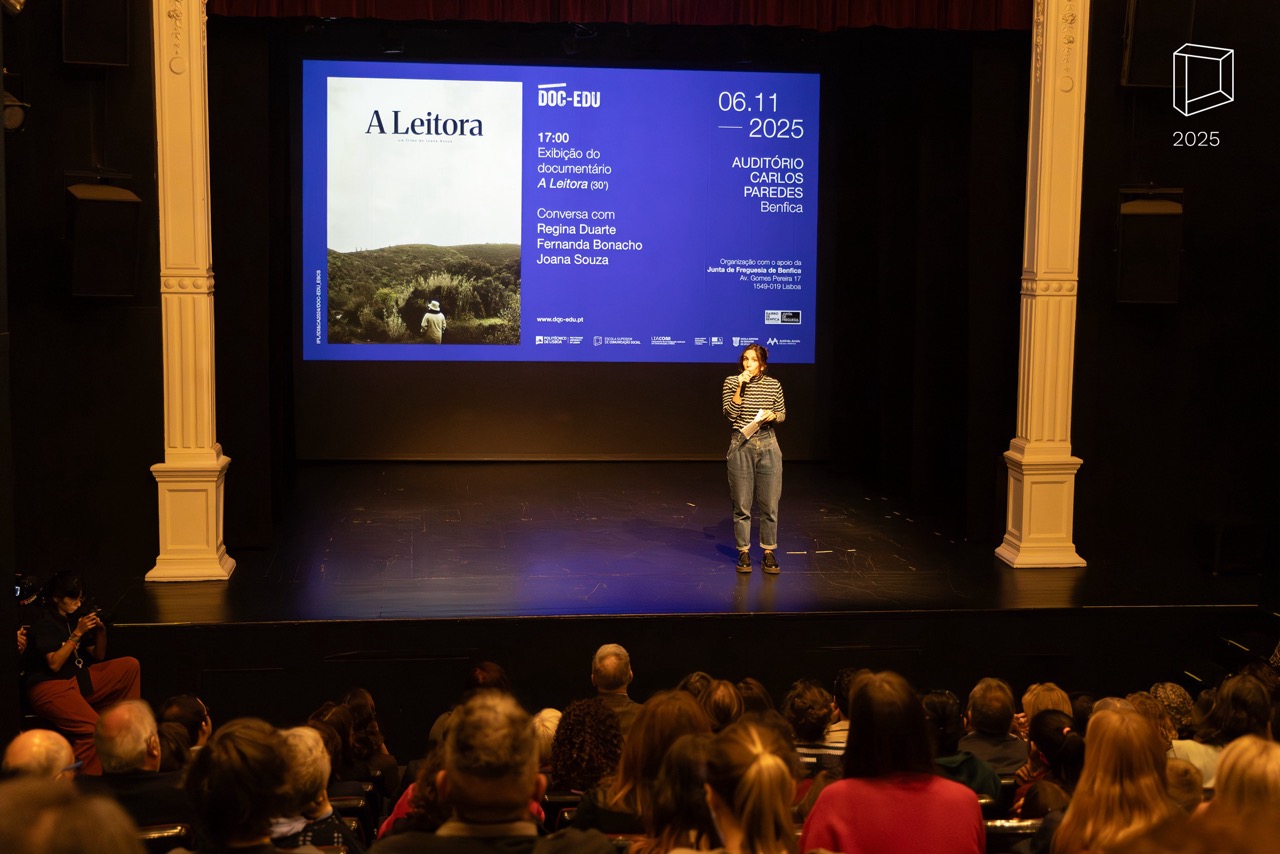Documentary “The Reader”: Reading as an act of resistance
The documentary “The Reader” (“A Leitora”, in the original), directed by Joana Souza, was screened for the first time on November 6th at the Carlos Paredes Auditorium in Benfica.
Around 110 people – both children and adults – attended this 30-minute film, which tells the story of how Maria became a reader and later a teacher.
In the documentary, the protagonist, now retired, returns to her hometown, a remote village in the Algarve countryside, to recall the random events that brought her closer to books – including the success of an unexpected reading during mass when she was a child. Maria also offers reflections on “how reading and writing are taught and learned in a specific time and place,” as described in the film’s presentation text.
Watch the trailer here.
“The Reader” is the main output of the research project DOC-EDU: Perspectives on the Initiation to Reading and Writing. From Production to Communication of an Audiovisual Educational Resource, developed by the School of Communication and Media Studies (ESCS-IPL) and LIACOM, in partnership with the Lisbon School of Education (ESELx), and funded by the Polytechnic University of Lisbon (IPL) through the IDI&CA programme.
In addition to Joana Souza, the project coordinator, the team includes Adriana Cardoso (ESELx), Joana Pontes (ESCS), João Ribeiro (António Arroio Artistic School), Susana Pereira (ESELx), and Ricardo Pereira Rodrigues (ESCS).
Reading as an act of resistance and audiovisual format as a vehicle of generosity
After the screening, a discussion took place with Joana Souza, the documentary’s director and professor at ESCS-IPL; Regina Duarte, Commissioner of the National Reading Plan (PNL); and Fernanda Bonacho, professor at ESCS-IPL and holder of the UNESCO Chair in Communication, Media and Information Literacy, and Citizenship at ESCS-IPL. The discussion was moderated by Adriana Cardoso, professor at ESELx-IPL.
All the speakers highlighted the transformative power of reading, both in individual development processes and as a factor promoting social equality – “reading is a social elevator,” emphasised Regina Duarte, quoting the protagonist of the story.
“Reading is an act of resistance and freedom,” added Fernanda Bonacho, referring to overcoming life circumstances – as seen in Maria’s story and many others –, the pursuit of knowledge, and the desire to understand the world in order to act upon it.
In addition to reflecting on the learning process of reading and writing, the discussion also focused on the format presented: the documentary.
For Joana Souza, the use of audiovisual media in this project “brings the generosity of allowing us to listen to the Other.” This was precisely one of the project’s goals: to explore “the potential of the documentary, not only as an educational resource but also as a medium for transmitting knowledge and recording memories within higher education institutions,” as stated in the project’s description.
At the end of the session, Maria, the protagonist of the story, who was present at the event, shared that participating in this documentary helped her become more aware of her own process of learning to read and the importance of having a positive self-image as a reader.
In her opinion, the circumstances that occurred “by chance” in her life should be intentionally provided by schools.
Above all, those who teach reading and writing should focus on instilling a passion for reading and curiosity. “The process doesn’t end when children learn to read; it ends when they want to read,” concluded Maria.
Looking ahead, the film is expected to be distributed in various contexts, including schools that provide teacher training in the areas of reading and writing, primary and secondary schools, libraries, municipal spaces, and other institutions working on this topic.
The António Arroio Artistic School and the UNESCO Chair in Communication, Media and Information Literacy, and Citizenship are also partners in this project.

